Related Research Articles
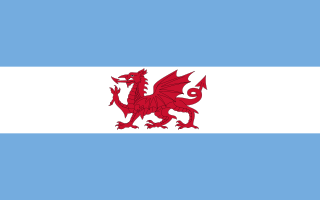
Y Wladfa, also occasionally Y Wladychfa Gymreig, refers to the establishment of settlements by Welsh immigrants in Patagonia, beginning in 1865, mainly along the coast of the lower Chubut Valley. In 1881, the area became part of the Chubut National Territory of Argentina which, in 1955, became Chubut Province.

In Welsh culture, an eisteddfod is a festival with several ranked competitions, including in poetry and music. The term eisteddfod, which is formed from two Welsh morphemes: eistedd, meaning 'sit', and fod, meaning 'be', means, according to Hywel Teifi Edwards, "sitting-together." Edwards further defines the earliest form of the eisteddfod as a competitive meeting between bards and minstrels, in which the winner was chosen by a noble or royal patron.

The Confederados were an estimated 10,000 to 20,000 American confederates who emigrated to the Empire of Brazil from the Southern United States after the American Civil War. Initially, most settled in the province of São Paulo, where they founded the city of Americana. While many returned to the US after the Reconstruction era, the descendants of other Confederados would later be found throughout Brazil.
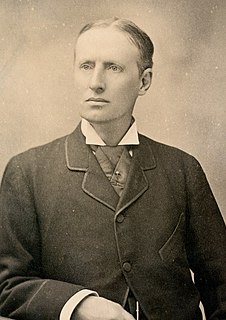
Sir William Cleaver Francis Robinson was an Irish colonial administrator and musical composer, who wrote several well-known songs. He was born in County Westmeath, Ireland, and was educated at home and at the Royal Naval School. He joined the Colonial Office service in 1858 and became the president of Montserrat in 1862. He married Olivia Edith Deane in 1862. He began serving as governor of the Falkland Islands in May 1866 and governed Prince Edward Island from 1870–1873, helping the island join a union with Canada. He became the governor of the Leeward Islands in 1874 and served his first term as the Western Australia governor from 1875–1877. He was appointed governor of the Straits Settlements in 1877 and served as governor of Western Australia a second term from April 1880 to February 1883.
The history of the Southern United States spans back hundreds of years, and includes the Mississippian people, well known for their mound building cultures. European history in the region began in the very earliest days of the exploration and colonization of North America. Spain, France, and England eventually explored and claimed parts of what is now the Southern United States, and the cultural influences of each can still be seen in the region today. In the centuries since, the history of the Southern United States has recorded a large number of important events, including the American Revolution, the American Civil War, the ending of slavery in the U.S., and the American Civil Rights Movement.

The history of Manchester encompasses its change from a minor Lancastrian township into the pre-eminent industrial metropolis of the United Kingdom and the world. Manchester began expanding "at an astonishing rate" around the turn of the 19th century as part of a process of unplanned urbanisation brought on by a boom in textile manufacture during the Industrial Revolution. The transformation took little more than a century.

Puerto Madryn is a city in the province of Chubut in Argentine Patagonia. It is the capital of the Viedma Department, and has about 93,995 inhabitants according to the last census in 2010.
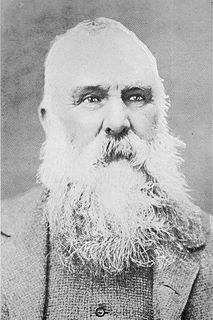
Michael Daniel Jones was a Welsh Congregationalist minister and principal of a theological college, but is best remembered as a founder of the Welsh settlement in Patagonia known as Y Wladfa and as one of the fathers of modern Welsh nationalism.
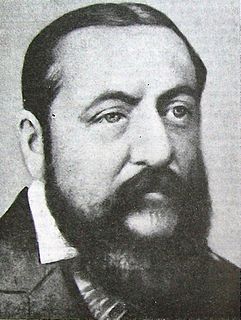
Sir Thomas Duncombe Love Jones-Parry, 1st Baronet, was a British landowner and Liberal politician. He was one of the founders of the Y Wladfa settlement in Patagonia.
Welsh Americans are an American ethnic group whose ancestry originates wholly or partly in Wales. In the 2008 U.S. Census community survey, an estimated 1.98 million Americans had Welsh ancestry, 0.6% of the total U.S. population. This compares with a population of 3 million in Wales. However, 3.8% of Americans appear to bear a Welsh surname.

Welsh settlement in the Americas was the result of several individual initiatives to found distinctively Welsh settlements in the New World. It can be seen as part of the more general British colonization of the Americas.

Mimosa was a clipper ship best known for carrying the first Welsh emigrants to South America in 1865.
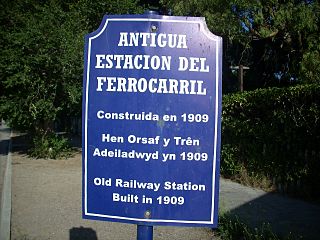
Patagonian Welsh is a variety of the Welsh language spoken in Y Wladfa, the Welsh settlement in Patagonia, Chubut Province, Argentina. The decimal numeral system used in Modern Welsh originated in Patagonia in the 1870s, and was subsequently adopted in Wales in the 1940s as a simpler counterpart to the traditional vigesimal system, which still survives in Wales.

Eluned Morgan, was a Welsh-language author from Patagonia. She was raised in Y Wladfa, a Welsh colony in Patagonia, and was taught to speak both Welsh and Spanish. Her father eventually enrolled her in Dr Williams' School in Wales, where she had to learn the English language. She led student protests against the school's English-only policy, which prohibited the use of Welsh by its students.
British Latin Americans are Latin Americans of British ancestry.
This article is about the particular significance of the year 1865 to Wales and its people.
Sir John Salusbury was a Welsh nobleman, explorer and co-founder of Halifax, Nova Scotia. He is credited as being one of the founders of modern Canada along with several other members of his expedition, including the Earl of Halifax and Edward Cornwallis. He served on the Nova Scotia Council throughout Father Le Loutre's War. He participated in the Battle at Chignecto. His diaries regarding the military campaign to establish a colony in Nova Scotia on behalf of the British Government became a vital source of information regarding the hardships, difficulties and opposition from the average Englishman regarding the development of the colony. He was a direct descendant of Katheryn of Berain.

Foreign relations between the Argentine Republic and the United Kingdom of Great Britain and Northern Ireland, have existed for over a century.

An American Brazilian is a Brazilian person who is fully, partially or predominantly of American descent or a U.S.-born immigrant in Brazil.

Patagonia is a 2010 Welsh-Argentine drama film co-written and directed by Marc Evans. The story centres on Welsh and Argentine people connected to "Y Wladfa", the Welsh settlement in Patagonia, Argentina. The film stars several well-known Welsh actors including Matthew Rhys, Nia Roberts and the singer Duffy. It premiered at the Seattle International Film Festival on 10 June 2010 and had its UK premiere in Cardiff on 4 March 2011.
References
- ↑ R. Bryn Williams (2000). Gwladfa Patagonia 1865–2000 = La colonia galesa de Patagonia 1865–2000 = The Welsh colony in Patagonia 1865–2000. Gwasg Carreg Gwalch. ISBN 0-86381-653-3.
- ↑ Your Archives: Patagonia 1899-1905